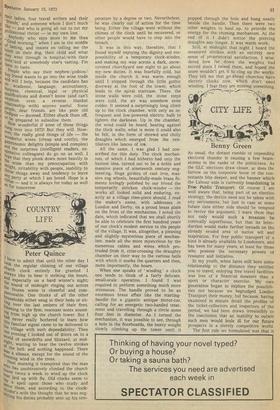COUNTRY LIFE Peter Quince
tl have to admit that until the other day I k the regular chiming of our village eoltreh clock entirely for granted I :h1W25's like to hear it striking the hours, 67 especially on a hard winter's night; th-e sound of midnight ringing out across "e frozen scene is cheerful and cornlilanionable. One thinks of all the other tPlIseholds either snug in their beds or sit1111 ig over the last embers of their fires, istening to the firm, resonant notes sound from high up the church tower. But I tha.d never really bothered to learn how this familiar signal came to be delivered to e village with such dependability. Then wile evening I looked out of doors on to a 1.1,°rld of snowdrifts and blizzard, at mid0,;ghf, waiting to hear the twelve strokes Iv the bell: and nothing happened. There f_as a silence, except for the sound of the `eezing wind in the trees. will\Text morning it transpired that the man t0? has unobtrusively climbed the church ,40,Wer twice a week to wind up the clock jaas laid up with flu. Old clocks seem to a spell upon those who study and W.'ve them, and according to the clockieloder's wife the thought that he was negcting.his duties probably sent up his tern perature by a degree or two. Nevertheless, he was clearly out of action for the time being. Either the village went without the chimes of the clock until he recovered, or other people would have to step into the breach.
It was in this way, therefore, that I found myself enjoying the dignity and responsibility of a temporary clock-winder, and making my way across a dark, snowcovered churchyard one night to go about my new duties. It was fearfully cold, but inside the church it was warm enough until I stepped through the little gothic doorway at the foot of the tower, which leads to the spiral staircase. There, the stone walls were cold, the stone steps were cold, the air was somehow even colder. It seemed a surprisingly long climb up to the clock chamber, with only an infrequent and low-powered electric bulb to lighten the darkness. Up in the chamber, the wind could be heard, beating against the thick walls; what is more it could also be felt, in the form of shrewd and chilly draughts which emerged from the ventilators like lances of ice.
All the same, I was glad I had conscribed for this duty. The clock mechanism, of which I had hitherto had only the haziest idea, turned out to be a noble and massive piece of nineteenth century engineering. Huge girders of cast iron, massive cog wheels, beautifully-made brass fitments lovingly polished by our friend the temporarily stricken clock-winder — the works all looked solid and enduring, exactly as a village time-piece should. I read the maker's name, with addresses in London and Derby, on a proud brass plate on the front of the mechanism. I noted the date, which indicated that we shall shortly be able to celebrate the first hundred years of our clock's modest service to the people of the village. It was, altogether, a pleasing and slightly mysterious piece of mechanism, made all the more mysterious by the numerous cables and wires which protruded from it, criss-crossing the draughty chamber on their way to the various bells with which it marks the quarters and then, more importantly, the hours.
When one speaks of ' winding ' a clock one tends to think of a fairly delicate, small-scale operation. I found I was required to perform something much more strenuous. The handle proved to be an enormous brass affair like the startinghandle for a gigantic antique motor-car, calling for an energetic two-handed treat ment and travelling through a circle some four feet in diameter. As I turned the mechanism, it was possible to see, through a hole in the floorboards, the heavy weight slowly climbing up the tower until it popped through the hole and hung neatly beside the handle. Then there were two other weights to haul up, to provide the energy for the chiming mechanism. At the end of it I didn't notice the piercing draughts any longer. It was warm work.
Still, at midnight that night I heard the measured strokes with an entirely new sense of proprietorial satisfaction. I wondered how far down the weights had moved since I raised them, and hoped the snow wouldn't get it to clog up the works. They tell me that go-ahead churches have electric clocks now, which don't need winding. I fear they are missing something.










































 Previous page
Previous page